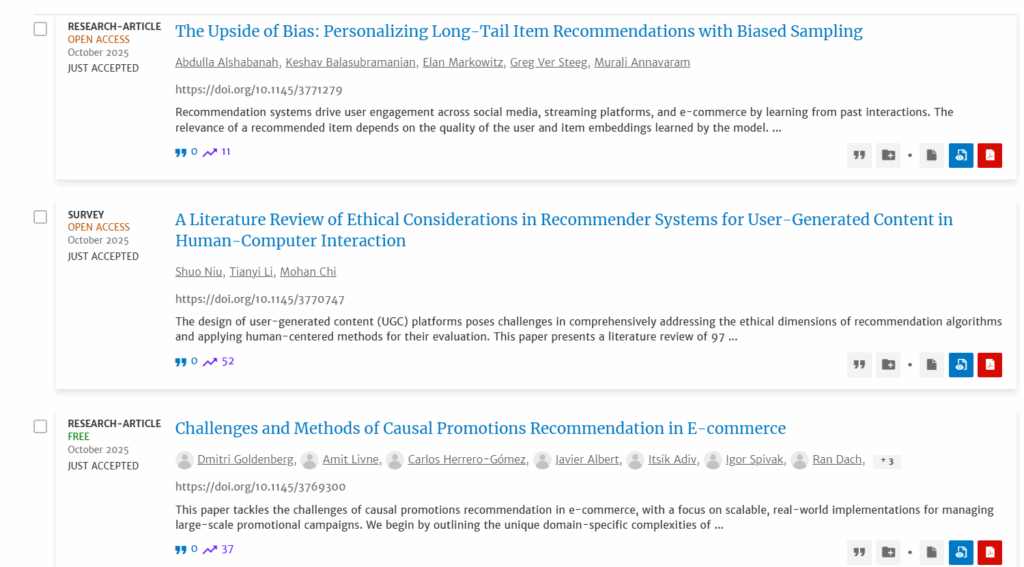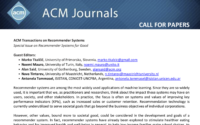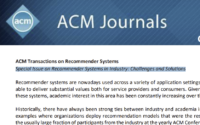New in ACM TORS: Smarter Promotions, Fairer Algorithms, and the Upside of Bias
ACM TORS announces a set of three newly accepted papers in ACM Transactions on Recommender Systems that showcase the journal’s topical diversity: one pushes the boundaries of causal inference for large-scale e-commerce promotions, one rethinks personalization for long-tail items through biased sampling, and one provides a comprehensive review of ethical considerations in user-generated content recommendations. Together, these works illustrate how recommender systems continue to expand—technically, methodologically, and ethically—addressing personalization, fairness, and causal reasoning in complex, real-world environments.

Causal recommendations for promotions in e-commerce (Goldenberg et al. 2025)
Dmitri Goldenberg and colleagues from Booking.com tackle the difficult challenge of making causal promotional recommendations in dynamic marketplaces. Their study introduces a steering framework that enables continuous experimentation and measurement across multiple promotional campaigns. Deployed at scale over 3.5 years, the framework improved campaign KPIs by more than 100 % after the first semester of adoption and increased experimentation velocity from 8 to 67 policy variants. The team formalizes uplift modeling under budget constraints, introducing two-dimensional evaluation metrics that jointly optimize incremental volume and incremental ROI. Notably, their evaluation shows “aggressive” strategies achieving up to 40 % higher incremental sales while maintaining positive unit economics, supported by robust variance control and time-aware modeling that corrects for delayed cost redemption. This paper demonstrates that causal machine learning can be successfully operationalized in large-scale, budget-constrained industrial settings—a milestone for the field.
Personalizing long-tail recommendations through biased sampling (Alshabanah et al. 2025)
Abdulla Alshabanah and collaborators from the University of Southern California and UC Riverside revisit the classic long-tail problem, proposing Biased User History Synthesis (BUHS) to improve both personalization and fairness in recommender systems. By deliberately oversampling rare (“tail”) items when building user embeddings, the method increases both diversity and accuracy. On MovieLens-1M, BUHS improved overall hit-rate @10 by 27.7 % and NDCG @10 by 29.9 % compared to a Two-Tower Neural Network baseline; tail-item hit-rate rose by 43.8 %. On BookCrossing, tail-item NDCG improved by up to 44 %, while energy-efficiency analysis showed negligible computational overhead. The authors provide an information-theoretic explanation: tail items carry more mutual information about a user’s identity than head items. Their findings confirm that promoting under-represented content not only enhances diversity but also yields more faithful user representations—a compelling case for “the upside of bias.”
Ethical challenges of user-generated-content recommenders (Niu et al. 2025)
Shuo Niu, Tianyi Li, and Mohan Chi present a systematic HCI-driven literature review of 97 studies on ethical issues in user-generated-content (UGC) recommendation. They categorize six major themes—adversarial content dynamics, privacy configuration, interest modeling and user reflection, transparency structure, socio-algorithmic fairness, and diversification—and reveal that interest modeling and user reflection dominates current research, appearing in 38 of 97 papers. Their analysis finds fairness discussed in 31 papers, especially regarding under-representation of minority creators and algorithmic governance. The review quantifies rising scholarly attention to UGC ethics: publications on this topic have nearly quadrupled over the past decade, with CSCW, NMS, and RecSys as the leading venues. It concludes with a call for participatory, user-centered evaluation frameworks that bridge algorithmic transparency with societal accountability—timely guidance for platforms balancing engagement and responsibility.
References
Alshabanah, A., Balasubramanian, K., Markowitz, E., Ver Steeg, G., & Annavaram, M. (2025). The Upside of Bias: Personalizing Long-Tail Item Recommendations with Biased Sampling. ACM TORS, https://doi.org/10.1145/3771279.
Goldenberg, D., Livne, A., Herrero-Gómez, C., Albert, J., Adiv, I., Spivak, I., Dach, R., Moraes, F., Proença, H. M., & Shapira, B. (2025). Challenges and Methods of Causal Promotions Recommendation in E-commerce. ACM TORS, https://doi.org/10.1145/3769300.
Niu, S., Li, T., & Chi, M. (2025). A Literature Review of Ethical Considerations in Recommender Systems for User-Generated Content in Human-Computer Interaction. ACM TORS, https://doi.org/10.1145/3770747.



